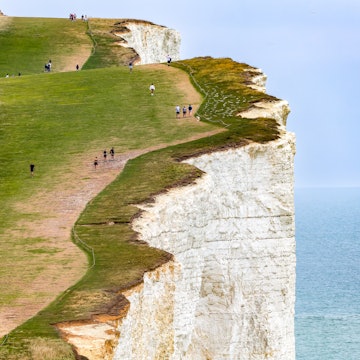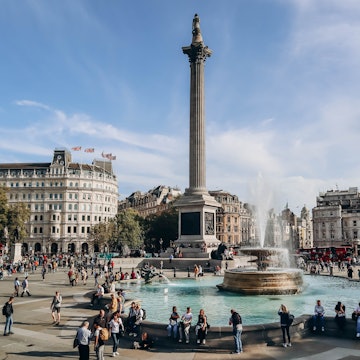

According to the UN, an estimated eight million tonnes of plastic waste enters our oceans every year © MOHAMED ABDULRAHEEM / Shutterstock
The idea of zero-waste travel may sound like a load of rubbish. But with so many restaurants, stores and hotels going plastic-free and composting (there are enough to fill an entire book), zero-waste journeys are becoming a reality in the 2020s.
Zero waste is a concept that's been around for a while but is new to the world of travel. Made popular by journalist Bea Johnson's bestselling book, Zero Waste Home, it's now a global movement. The idea is to make a home, community or even region free of disposable waste. It encourages less consumption and buying recyclable or biodegradable products, rather than sending waste to landfill sites, incinerators and our oceans. The basic guideline is adhering to the 5 Rs – Refuse, Reduce, Reuse, Recycle and Rot.
With growing numbers of people actively reducing their garbage at home, it’s not surprising that travelers are now looking for ways to keep their waste down when they’re away. Aside from offsetting your carbon footprint, zero waste is about taking the 5 Rs on the road. This is not always easy, so you’ll need to use the 6th R – a bit of Research.
Some destinations, such as the idyllic Italian island of Capri, have already banned single-use plastics and the rest of the EU is due to follow in 2021. Boulder, Austin and San Francisco are just some US cities that have signed up to become zero waste (or darn near) by 2040.
But is this enough? According to the UN, an estimated eight million tonnes of plastic waste enters our oceans every year. And the numbers get worse: one million seabirds die each year from ingesting plastic and one million plastic drinking bottles are purchased every minute.
Of course, travelers alone are not to blame for the waste crisis. The soft drinks, food packaging and plastic production industries are due a shake-up, but our travel choices also matter. Here are some places where you can be part of the solution and not the problem.
Editor's note: during COVID-19 there are restrictions on travel. Check the latest guidance before departure, and always follow local health advice.

Visionary cities
Cities are often associated with high pollution, but they are also where creative solutions are born and thrive. In fact, a number of cities around the world are leading the zero-waste movement and encourage travelers to take part.
Amsterdam, the Netherlands
Amsterdam could win the "Most-Accomplished Zero-Waste City" award. Bring your own containers to fill up with organic produce at the Albert Cuyp Food Market, stay at one of the city’s Conscious Hotels or fish for plastic on a canal boat with Plastic Whale.
Ljubljana, Slovenia
Dubbing itself the "First Zero-Waste City", the Slovenian capital proudly recycles 70% of its waste. Package-free vending machines, rows of recycling bins and zero-waste shops like Rifuzl are just some reasons why it’s ahead of the pack.
Vancouver, Canada
Like the EU, in 2021 Vancouver introduces a ban on plastic straws, polystyrene packaging and free shopping bags. Stay at the waste-free Listel Hotel and visit the Zero Waste Centre to see how everything can be reused or recycled.

Best of the bulk buys
The rise of zero-waste stores is a relatively recent phenomenon, but there are already thousands of shops worldwide where food is delivered and sold without plastic packaging and shoppers can refill using their own containers.
The Hive, Malaysia
Malaysians are acutely aware of plastic pollution; until recently it was one of the biggest importers of waste from richer nations. The Hive Bulk Foods in Kuala Lumpur tries to redress the balance with a diverse range of unpackaged groceries, oils and toiletries.
Precycle, USA
The first package-free store in New York, Precycle in Brooklyn partners with local farms only and lets shoppers buy in bulk. This means no plastic, no cardboard and no waste.

Restaurants without trash
Plastic-free or free plastic? While fast-food chains may be a major cause of waste, a growing crop of zero-waste restaurants has designed their menus and preparation purely with the garbage in mind.
Silo, UK
You won’t find a single bin at Silo, a hip restaurant in the Hackney Wick suburb of London. Run by eco-chef Douglas McMaster, the kitchen’s food scraps are put into compost and ingredients are sourced locally.
Copacabana Surf Village, Senegal
Fed up with the amount of plastic waste washing up on the shores of Virage Beach in Dakar, Babacar Thiaw turned his father’s surf shop into West Africa’s first zero-waste bar and restaurant.
Frea, Berlin
Frea in Berlin offers fresh, waste-free, vegan food, from delicious salads to puff pastries. Its bread and pasta are made with flour from Bavaria, and it makes its own hazelnut milk and uses a compost machine.

Non-trash trips and activities
Responsible travel was always about "treading lightly" – causing as little impact as possible to nature. But some travelers want to go one step further and protect the places they explore.
Yellowstone National Park, USA
Safari America, run by Natural Habitat, is a zero-waste adventure trip in the vast Yellowstone National Park. Travelers are equipped with reusable water bottles, there is a TerraCycle recycling system on vehicles, and emissions are offset through reforestation.
Tel Aviv, Israel
Tel Aviv’s beaches rank third highest for plastic waste in the Mediterranean. But the city has a growing zero-waste community, Plastic Free Israel, through which travelers can participate in waste workshops and regular beach clean-ups with the whole family.
You might also like:
7 steps to being a mindful traveler
13 ways to reduce your carbon emissions when traveling
7 stunning eco-hotels for the environmentally conscious traveler in 2021






















